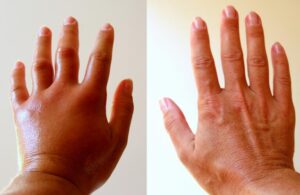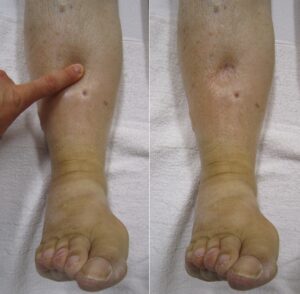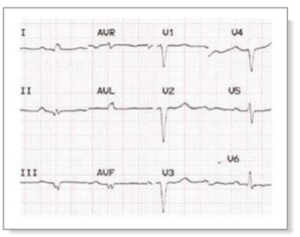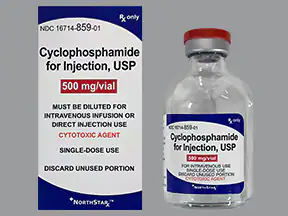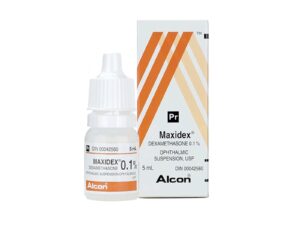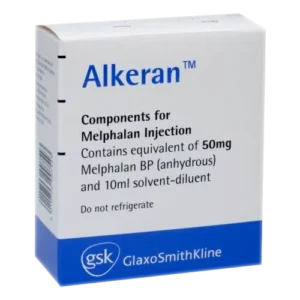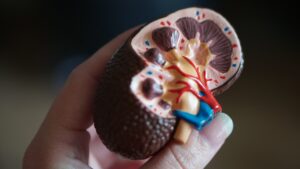AA (Secondary) Amyloidosis
Enlarged Kidney (Kidney Damage)
Frothy/Bubbly Urine (Kidney Damage)
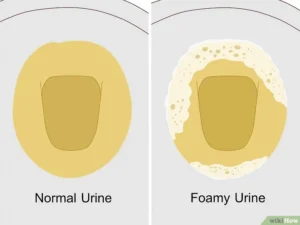
Foamy urine is a sign of protein in the urine, which is not normal. “Kidneys filter the protein, but should keep it in the body,” explains Dr. Ghossein. If kidneys are releasing protein into the urine, they are not working properly.
Fluid Swelling (Peripheral Edema) hands, legs or feet
If the amyloidosis affects the kidneys, their ability to filter the blood becomes impaired. Protein leaks from the blood into the urine. The loss of protein from the blood can cause fluid to leak out of the blood vessels, resulting in swelling in the feet, ankles and calves.
Infrequent Urination (Kidney damage)
Most commonly, amyloid deposits build up in the heart and kidneys. Roughly 70% of patients have involvement with either of these organs, notes Dr. Weiss.
Low QRS voltages (LQRSVs) (Cardiac Amyloidosis)
Typical ECG of a patient with cardiac AL amyloidosis showing low QRS voltages in the limb leads and pseudoinfarction pattern in the chest leads. (from Updates in Cardiac Amyloidosis: A Review; Banypersad S et al; J Am Heart Assoc 2012)
Nausea & Vomiting
Low Blood Pressure
Cyclophosphamide (Cytoxan®, Neosar®)
Dexamethasone (Ozurdex, Maxidex)
The use of cyclophosphamide (Cy), bortezomib (Bor), and dexamethasone (D), the CyBorD regimen, to treat AL amyloidosis, caused by a non-immunoglobulin M (IgM) monoclonal gammopathy, has significantly improved survival outcomes [10]: CyBorD results in a complete hematologic response of 71% and a 1-year OS of 65%
Melphalan (Alkeran)
Melphalan belongs to the group of medicines called alkylating agents (cancer medicines). It works by interfering with the growth of cancer cells, which are eventually destroyed by the body. Since the growth of normal cells may also be affected by melphalan, other unwanted effects will also occur.
Prednisone (steroid)
Tocilizumab, a humanized monoclonal anti–IL-6 receptor antibody
Care Team Basics
Studies have found that patients who receive care from a coordinated care team have better health outcomes, including lower rates of hospitalization and mortality. They also have higher rates of satisfaction with their care.
A care team is a group of healthcare professionals who work together to provide care for a patient. The care team may include doctors, nurses, therapists, social workers, and other specialists. The team works together to develop a plan of care and coordinate services.
Care Team Coordinator
A care coordinator is a health care professional responsible for managing patient care by monitoring treatment plans, educating patients on their conditions, and connecting them to relevant health care providers.
Cardiologist (Heart)
A cardiologist is a physician who’s an expert in the care of your heart and blood vessels. They can treat or help you prevent a number of cardiovascular problems. They can also specialize in specific areas, such as abnormal heart rhythms, heart failure or heart problems you’ve had since birth. [source: Cleveland Cllinic]
Nephrologist (Kidneys)
A nephrologist is a medical doctor who specializes in kidney care and treating diseases of the kidneys. The term nephrologist comes from the Greek word “nephros”, which means kidney or renal and “ologist” refers to someone who studies. Nephrologists are also called kidney doctors.
Neurologist (Brain & Nervous System)
A neurologist is a medical doctor with specialized training in diagnosing, treating, and managing disorders of the brain and nervous system including, but not limited to, Amyloidosis, Alzheimer’s disease, amyotrophic lateral sclerosis (ALS), concussion, epilepsy, migraine, multiple sclerosis, Parkinson’s disease, and stroke.
Psychologist (Emotional Wellbeing)
A psychologist is a mental health professional who uses psychological evaluations and talk therapy to help people learn to better cope with life and relationship issues and mental health conditions. [source: Cleveland Clinic]
Social Worker
Social workers assist a range of patient populations and provide services in areas including mental health conditions and addictions, chronic disease, children and youth illnesses, geriatrics illnesses, grief, trauma, parenting issues, palliative care, dementia and other neurological issues, financial stressors, housing issues and a broad range of other general psychosocial issues (Ashcroft et al. 2018; McGregor et al. 2018; Sverker et al. 2017).
Rheumatologist (Joints, Muscles and Bones)
Research
Stay Up To Date:
Featured Resources

Caregiver Support : Taking care of yourself


